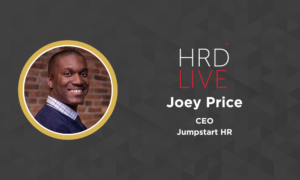Defining true leadership: Jamie Anderson, President, EMEA, Marketo
- 4 Min Read
Louron Pratt spoke to Jamie Anderson, President, EMEA, Marketo, about the changing role of the leader, and how to define true leadership.
- Author: Louron Pratt
- Date published: Jul 29, 2019
- Categories

Leadership defines an organisation and its ability to succeed. The skills and characteristics expected of leaders, however, are changing. HRD Connect spoke to Jamie Anderson, President, EMEA, Marketo, about the changing role of the leader, and how to define true leadership.
What are the most important traits for a leader?
The first thing is that they must be able listen. Leadership isn’t just about managing people, it’s about listening to people and empowering them to believe that the ideas that they have are meaningful, worthwhile, and can be put into action.
A good leader wants people to challenge them and can encourage their employees to have an opinion. I’ve worked for people in the past who have been so autocratic and micromanaging that I’ve walked away with zero respect for them. The essence of leadership is helping people find their voice.
Has the role of a leader changed drastically in the past 10 years?
Those traits that I described have always been the most important, but leaders who have recognized recent developments in working, such as flexible working and a work-life balance, are the most successful today.
What are your thoughts on the new generation entering the workforce?
This generation has social consciousness, principles of how they should approach the workplace, and career aspirations. They almost embody the unfulfilled potential of my generation. Most of the people that grew up in my era are the sons and daughters of factory workers, fuel workers, shipbuilders, and railway workers. It was a struggle for our generation, growing up against the backdrop of the deindustrialization of our own country. This new generation which has an incredible social conscious around environmentalism, inclusivity, and is much more powerful. This generation could change the world.
People forget what it was like to be young and to start a job. They forget that they made mistakes. Hiding from mistakes leads to dishonesty, and having an understanding empathetic manager that can help you understand why that thing you did wasn’t great and how you could improve it is important. Having an empathetic leader who’s adaptable and can walk in the shoes of their employees is crucial.
Do you think technology in the workplace is more of a threat or an opportunity?
Technology has the power to better connect us, and to drive greater inclusion. I’ve worked in technology for 25 years and even though I’ve seen every major change I still get excited and get more enthusiastic about its ability to bring us together and bring generations together.
People still fear artificial intelligence and machine learning, but we regularly need to connect through technology, whether we’re marketing to someone or trying to get a message to them. The reason we need developments in technology like artificial intelligence and machine learning is because there are so many more data points available than there were before. It would be impossible for a single human being to moderate through all the data feeds.
The only way to get quality information to people is to understand who they are, so if artificial intelligence and machine learning help us do our core jobs better then it’s a good thing.
How much of an impact do you feel like a CEO can have on a business?
If you want to see the impact of a CEO, look two levels down. If the senior leaders don’t live and embody that spirit of the message that the CEO carries, then something has been lost in translation. If you drop down two levels in any business and you find that management is autocratic and micromanaging, or you’re on the way to work in the morning and you get that anxious feeling in your stomach before you even start your day, the question lies with whether the CEO is effective.
Jamie Anderson is Marketo’s President of EMEA, overseeing business operations across the region. He is a recognized thought leader in the customer engagement space and noted for his track record in building winning teams. Jamie joined Marketo in October 2017, bringing with him more than 20 years of experience in marketing and business development. Prior to Marketo, he served as senior vice president and chief marketing officer at SAP Hybris.









